Table of Contents
Paul Clement hopes to file cert. petition calling on SCOTUS to overrule abortion buffer zone case — First Amendment News 426
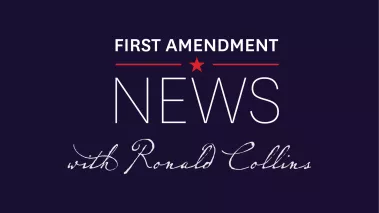
First Amendment News is a weekly blog and newsletter about free expression issues by Ronald K. L. Collins. It is editorially independent from FIRE.
Does the deck seem stacked? You bet. As I have suggested throughout this opinion, today's decision is not an isolated distortion of our traditional constitutional principles, but is one of many aggressively pro-abortion novelties announced by the Court in recent years. See, e. g., Madsen v. Women's Health Center, Inc. (1994); Schenck 765 v. Pro-Choice Network of Western N. Y., (1997); Thornburgh v. American College of Obstetricians and Gynecologists (1986). Today's distortions, however, are particularly blatant. – Justice Scalia dissenting in Hill v. Colorado (2000).
Many know Paul D. Clement as a seasoned Supreme Court litigator with over 100 arguments in that chamber — he has argued more Supreme Court cases since 2000 than any lawyer in or out of government. Others know him for his many skills as solicitor general of the United States from 2004 to 2008. Still others know him as a former law clerk to Justice Antonin Scalia (1993 to 1994), when Madsen v. Women's Health Center, Inc. was handed down (with Scalia dissenting in part regarding abortion buffer zones).
Well, Mr. Clement is back on the constitutional scene with an application to Justice Amy Coney Barrett for an extension of time to file a cert. petition in Coalition Life v. City of Carbondale. As stated in his petition:
[T]he City of Carbondale, Illinois passed an Ordinance on January 11, 2023, that prohibits any person within a 100-foot radius of a hospital, medical clinic, or healthcare facility from “[k]nowingly approach[ing] another person within eight feet ... unless [that] person consents, for the purpose of passing a leaflet or handbill to, displaying a sign to, or engaging in oral protest, education, or counseling with such other person.” Carbondale, Ill., City Code §14-4-2(H) (2023). The Ordinance seeks to unlawfully prohibit pro-life groups, including Applicant Coalition Life, from speaking to or interacting with people outside of abortion facilities and extends to public rights of way. The Ordinance does not appear to have been prompted by any demonstrated spate of violence or harassment in Carbondale, but rather appears to have been prompted, perversely, by this Court’s decision in Dobbs v. Jackson Women’s Health Org., 597 U.S. 215 (2022).
The City of Carbondale modeled its Ordinance after an identical statute that this Court upheld in Hill v. Colorado (2000).
It is against that backdrop that Mr. Clement tendered the following arguments, among others (numbers added):

- [Hill questioned in the McCullen case]: In more recent years, however, this Court (and others) have questioned the logic and reasoning of Hill, and by extension, the City of Carbondale’s reliance on it. In McCullen v. Coakley, for example, this Court set aside a statute that imposed a fixed 35-foot buffer zone around abortion facilities in Massachusetts, and exempted only certain people (such as patients, employees, law enforcement, and fire-fighters) from its enforcement.
- [Hill questioned in the Reed case]: [The] Court brought Hill into further disrepute in Reed v. Town of Gilbert (2015). There, the Court first clarified that a speech restriction “is content-based if [it] applies to particular speech because of the topic discussed or the idea or message expressed.” That question, the Court observed, “requires” consideration of “whether a regulation of speech ‘on its face’ draws distinctions based on the message a speaker conveys,” whether by its “subject matter” or its “function or purpose.” This Court also highlighted that some facially neutral laws should be deemed content based if they “cannot be justified without reference to the content of the regulated speech” or if “adopted by the government because of disagreement with the message the speech conveys.”
- [Hill’s logic was rejected in the Dobbs case]: [T]his Court decimated what remained of Hill’s foundation in Dobbs v. Jackson Women’s Health Org. (2022). In Dobbs, this Court cited Hill as the poster child for cases in which the Court’s now-overruled abortion decisions “have distorted First Amendment doctrines.”
- [Hill should be overruled]: At bottom, this Court long ago made clear that Hill v. Colorado was an anomaly in a doctrinal area where the need for consistency and neutrality are paramount. It should therefore provide the City of Carbondale no further refuge to restrict speech in ways that skew the debate on important issues this Court has now left to the democratic process. But until this Court formally overturns Hill, the case will continue to stand in the way of Coalition Life’s protected speech in public places, which lies at the heart of the First Amendment.
Note: “Applicant’s counsel Paul D. Clement was not involved in the proceedings below and was only recently retained. Applicant’s counsel requires additional time to review the record, prior proceedings, and the governing precedent relevant in this case in order to prepare and file a petition for certiorari that best presents the arguments for this Court’s review.”
** Thanks to David Keating for bringing this matter to my attention.
Related
- “Supreme Court cert. petition on another abortion buffer zone case,” FAN 249 (April 8, 2020)
NRA First Amendment victory — 9-0!
In National Rifle Association of America v. Vullo, the Supreme Court recently held that “the NRA plausibly alleged that former superintendent of the New York Department of Financial Services Maria Vullo violated the First Amendment by coercing regulated entities to terminate their business relationships with the NRA to punish or suppress the NRA’s gun-promotion advocacy.”
Justice Sonia Sotomayor wrote the opinion for the Court, and Justices Neil Gorsuch and Ketanji Brown Jackson each filed a concurring opinion.
Professor Eugene Volokh was the counsel of record for the petitioners.
In the third unanimous judgment rendered by the Roberts Court in a First Amendment free expression case, Justice Sotomayor delivered her third majority opinion. (See Ronald Collins and David Hudson, “The Roberts Court—Its First Amendment Free Expression The Roberts Court—Its First Amendment Free Expression Jurisprudence: 2005–2021,” Brooklyn Law Review (2021)).
Select Commentary
- Amy Howe, “Supreme Court rules for NRA in First Amendment dispute,” SCOTUSblog (May 30)
- “Good day for freedom of expression and rule of law at Supreme Court,” FIRE (May 31)
- Iam Millhiser, “The NRA just won a big Supreme Court victory. Good,” Vox (May 30)
Citizen journalist cert. petition draws broad support
- Adam Steinbaugh and Colin McDonell, “Broad ‘friend of the court’ support pours into Supreme Court for citizen journalist Priscilla Villarreal,” FIRE (May 29)

The government cannot jail journalists for asking a question. But local officials in Laredo, Texas, did just that, arresting citizen journalist Priscilla Villarreal for exercising her core First Amendment right to ask government officials for information as part of her local news reporting.
The officials relied on a criminal statute, never enforced locally in the law’s 23-year history, prohibiting people from asking government officials for information that “has not been made public” if they want to “obtain a benefit.” That supposed benefit? Public attention — what every good journalist strives for to raise awareness about issues of public concern.
Even though Priscilla was arrested for routine journalism that the First Amendment squarely protects, a sharply divided U.S. Court of Appeals for the Fifth Circuit ruled that the police officers and prosecutors who conspired to arrest Priscilla are entitled to qualified immunity and do not have to face a lawsuit.
On April 22, FIRE filed a petition for a writ of certiorari asking the Supreme Court to hear Priscilla’s case. Now, a diverse coalition of individuals and organizations, including press freedom advocates and critics of qualified immunity, have supported our effort with “friend of the court” briefs. These 13 amicus curiae briefs urge the Supreme Court to take Priscilla’s case in order to protect the First Amendment right to investigate and report the news and to hold officials accountable when they trample those rights.
Status of Trump’s gag order?
- “Is Trump Still Under a Gag Order After His Conviction? He Thinks So, but the Answer Isn’t Clear,” First Amendment Watch (June 3)
Donald Trump said he remains muzzled by a gag order after his conviction in his hush money criminal trial. His lawyer said he thinks the gag order was supposed to expire with the verdict and he may seek clarity from the court.
“I’m under a gag order, nasty gag order,” the former president said Friday while speaking to reporters at Trump Tower. Referring to star prosecution witness Michael Cohen, Trump said: “I’m not allowed to use his name because of the gag order.”
But, despite saying he believes he’s still subject to the order banning comments about witnesses and others connected to his case, Trump again lashed out at his former lawyer-turned-courtroom foe.
[ . . . ]
Trump lawyer Todd Blanche said Friday that it was his understanding that the gag order would be lifted when the trial ended with a verdict, because that’s how prosecutors framed their request when they sought the restrictions back in February. But, Blanche said, he thinks Trump is still trying to be careful because it isn’t clear to him whether that’s actually happened. During the trial, Judge Juan M. Merchan held Trump in contempt of court, fined him $10,000 for violating the gag order and threatened to put him in jail if he did it again.
“I don’t want President Trump to violate the gag order,” Blanche said. “I don’t think it applies anymore. I feel like the trial is over and it shouldn’t.
Maryland attempts to evade 1943 First Amendment flag-salute precedent
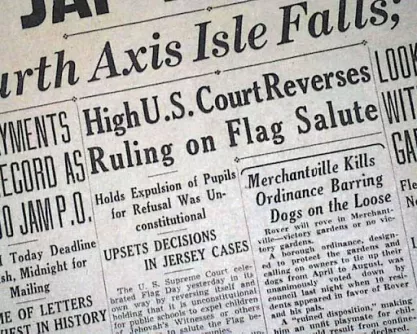
- “Pledge allegiance or else: Maryland public school forces students and teachers to salute the flag,” FIRE (May 30)
The Foundation for Individual Rights and Expression today demanded that a public elementary school in Maryland retract its unconstitutional guidance that students and staff must stand and salute the U.S. flag during the Pledge of Allegiance.
On April 26, Twin Ridge Elementary School in Mount Airy, a D.C. and Baltimore suburb, emailed all staff attempting to clear up questions about reciting the Pledge of Allegiance. The email told staff that under the Maryland Education Code, “all students and teachers are required ‘to stand and face the flag and while standing give an approved salute and recite in unison the pledge of allegiance.’”
But the school omitted the crucial fact that Maryland law also includes an opt-out provision saying that “any student or teacher who wishes to be excused from the requirements . . . shall be excused.” The option to sit out the Pledge of Allegiance isn’t only required by state law — it’s required by the First Amendment, which bars the government from forcing anyone to affirm any viewpoint or ideology.
FIRE’s letter calls on Twin Ridge Elementary School to retract the erroneous directive and notify staff and students about their rights under both Maryland law and the Constitution to decline to participate in the Pledge of Allegiance.
“The First Amendment protects not only your right to express yourself, but also the right to refrain from doing so,” said FIRE Senior Program Officer Stephanie Jablonsky. “That includes refusing to salute the flag. Mandatory patriotism is no patriotism at all.”
Twin Ridge Elementary School didn’t only misrepresent Maryland law. It also ignored nearly a century of Supreme Court precedent. The court ruled in the landmark 1943 case West Virginia State Board of Education v. Barnette that the First Amendment does not allow public schools to compel students to participate in the Pledge of Allegiance.
“If there is any fixed star in our constitutional constellation, it is that no official, high or petty, can prescribe what shall be orthodox in politics, nationalism, religion, or other matters of opinion or force citizens to confess by word or act their faith therein,” wrote Justice Robert Jackson for the majority.
While Barnette involved grade school students, its forceful articulation of freedom of conscience extends beyond that context. For example, later Supreme Court rulings have protected public employees from compulsory oath participation. As the Court said in one case, “neither federal nor state government may condition employment on taking oaths that impinge on rights guaranteed by the First and Fourteenth Amendments.”
“Liberty and justice for all means liberty and justice for all, including students and teachers who dissent from the government position,” said FIRE Director of Public Advocacy Aaron Terr. “Forced loyalty oaths violate the very ideals that make America worth pledging allegiance to in the first place.”
Harvard to end issue statements
- Angel Eduardo, “In big win for campus free speech, Harvard won’t issue statements on hot-button social and political issues,” FIRE (May 28)
In a refreshing turn of events, Harvard University officially announced on Tuesday that neither the school nor its leaders will “issue official statements about public matters that do not directly affect the university’s core function.”
University leadership — including its highest governing board, the Harvard Corporation — accepted this recommendation and others from a Harvard faculty working group report.
Harvard’s “core function,” the report states, is to “cultivate an environment in which its members can research, teach, and learn.” To succeed, the university must commit “itself to the values of free inquiry, intellectual expertise, and productive argument among divergent points of view.”
Harvard has adopted principles of institutional neutrality similar to those described in the University of Chicago’s “Kalven Report” — which FIRE officially endorsed last fall. As FIRE explains, institutional neutrality is “the idea that colleges and universities should not, as institutions, take positions on social and political issues unless those issues ‘threaten the very mission of the university and its values of free inquiry.’ Instead, these discussions should be left to students and faculty.”
Upcoming June conference on AI and the First Amendment
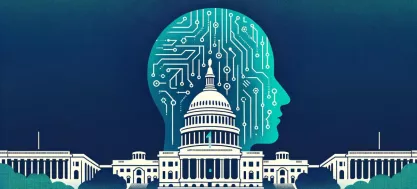
- “Artificial Intelligence & The First Amendment: Protecting Free Speech in the AI Era,” The Future of Free Speech (June 24)
Hosts & Event Description: The Future of Free Speech and the Center for Democracy and Technology will bring together leading voices to discuss how freedom of expression principles, both in the U.S. and abroad, should apply to generative AI and explore ways to create a resilient free-speech culture in the AI era.
Date & Time: Monday, June 24 — 9:00 am -3:45 pm
Location: 2000 Florida Ave. NW, Washington, DC 20009
Program & Participants
Panel 1: The View from Congress
Halie Craig — Tech Policy Director, Senate Commerce Committee
John Beezer — Senior Advisor, Senate Commerce Committee
Jacqui Kappler — Chief Democratic Counsel, House Judiciary Committee
Panel 2: The First Amendment and AI
Jeff Kosseff — Non-Resident Senior Fellow, The Future of Free Speech
Eugene Volokh — Professor, UCLA Law School & incoming Senior Fellow, Hoover Institution at Stanford University
Keith Chu — Chief Communications Adviser and Deputy Policy Director, Senator Ron Wyden (D-Oregon)
Ben Wizner — Director, ACLU Speech, Privacy, and Technology Project
Moderator: Kate Ruane — Director, Free Expression Project, Center for Democracy & Technology
Panel 3: How Do Companies Balance Free Speech and Safety?
Dave Willner — Non-Resident Fellow, Program on Governance of Emerging Technologies at Stanford University
Jules White — Professor of Computer Science, Vanderbilt University
Jess Miers — Senior Counsel, Chamber of Progress
Jacob Mchangama — Founder and Executive Director, The Future of Free Speech
Panel 4: Civil Society’s Role in the AI Boom
Nadine Farid Johnson — Policy Director, Knight First Amendment Institute at Columbia University
Ashkhen Kazaryan — Senior Fellow, Free Speech & Peace, Stand Together
TBD — Representative from Center for Democracy & Technology
Related
- Jacob Mchangama and Jules White, “The Future of Censorship Is AI-Generated,” Time (Feb. 26)
New scholarly article on ‘debunking’ bot rights
- Abeba Birhane, Jelle van Dijk, and Frank Pasquale, “Debunking Robot Rights Metaphysically, Ethically, and Legally,” First Monday (April 2024)
In this work we challenge the argument for robot rights on metaphysical, ethical and legal grounds. Metaphysically, we argue that machines are not the kinds of things that may be denied or granted rights. Building on theories of phenomenology and post-Cartesian approaches to cognitive science, we ground our position in the lived reality of actual humans in an increasingly ubiquitously connected, controlled, digitized, and surveilled society. Ethically, we argue that, given machines’ current and potential harms to the most marginalized in society, limits on (rather than rights for) machines should be at the centre of current AI ethics debate. From a legal perspective, the best analogy to robot rights is not human rights but corporate rights, a highly controversial concept whose most important effect has been the undermining of worker, consumer, and voter rights by advancing the power of capital to exercise outsized influence on politics and law.
The idea of robot rights, we conclude, acts as a smoke screen, allowing theorists and futurists to fantasize about benevolently sentient machines with unalterable needs and desires protected by law. While such fantasies have motivated fascinating fiction and art, once they influence legal theory and practice articulating the scope of rights claims, they threaten to immunize from legal accountability the current AI and robotics that is fueling surveillance capitalism, accelerating environmental destruction, and entrenching injustice and human suffering.
New scholarly article on AI and the right to lie
- Daxton Stewart and Jeremy Littau, “The Right to Lie with AI? First Amendment challenges for state efforts to curb false political speech using deepfakes and synthetic media,” SSRN (2024)
As the first major U.S. election in the era of widespread, accessible artificial intelligence (AI) tools approaches, several states have passed laws aimed at curbing the spread of false photos, videos, and audio of candidates. Authors review deepfake and AI technology and legislative efforts to regulate them, finding strong First Amendment protection for false political speech that may thwart most legislative efforts beyond mandatory disclaimers. Technological solutions are proposed as an alternative.
New scholarly article: Alexander Volokh on Universities’ First Amendment Right to Affirmative Action
- Alexander Volokh, “Expressive Discrimination: Universities’ First Amendment Right to Affirmative Action,” SSRN (Feb. 15)
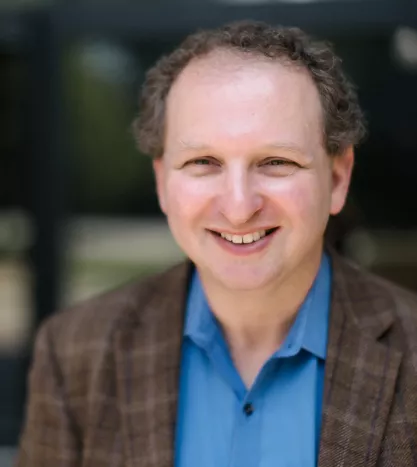
In the wake of Students for Fair Admissions, Inc. v. President & Fellows of Harvard College, affirmative-action proponents should pursue a First Amendment approach. Private universities, which are speaking associations that express themselves through the collective speech of faculty and students, may be able to assert an expressive-association right, based on Boy Scouts of America v. Dale, to choose their faculty and students. This theory has been recently strengthened by 303 Creative LLC v. Elenis.
I discuss various complexities and counterarguments: (1) Race is not different than sex or sexual orientation for purposes of the doctrine. (2) The market context may not matter, especially after 303 Creative. (3) The conditional-federal-funding context does give the government more power than a simple regulatory context: the government will still be able to induce race-neutrality by the threat of withdrawing federal funds. But the unconstitutional conditions doctrine precludes draconian penalties like withdrawing all funds from the entire institution based only on affirmative action in some units. (4) This theory doesn’t apply to public institutions.
I also explore the potential flexibilities of this theory, based on recent litigation. The scope of the Boy Scouts exception might vary based on (1) what counts as substantial interference with expressive organizations, (2) what counts as a compelling governmental interest, and (3) most importantly, what it takes for activity to be expressive. Because the test for expressiveness relies largely on social expectations about what particular actions “mean,” there is some chance that behavior beyond the university context—like affirmative action in charitable donations—might be brought within the Boy Scouts exception.
New book (catch this!) on plastic surgery and the First Amendment
- Josh King, “Sculpting Expression: A First Amendment Guide for Plastic Surgeons” (Independently published, May 28)
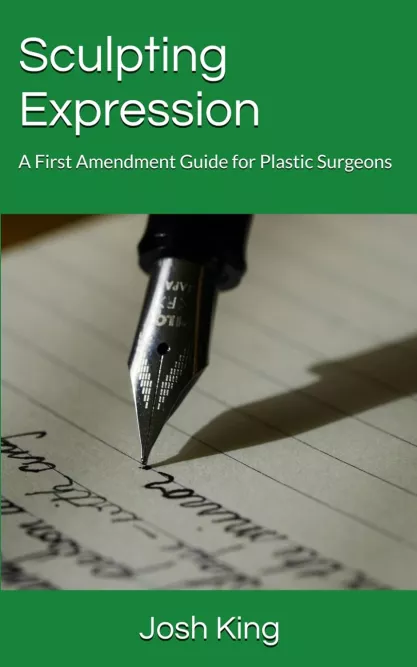
In “Sculpting Expression,” doctors can unlock the power of communicating about their practice with a groundbreaking exploration of the intersection between the First Amendment and the practice of medicine. Discover how plastic surgeons can confidently navigate different mediums of expression while building relationships with patients and the public – all without putting their medical licenses at risk.
More in the news
- Steven Calabresi, “American Voters Need Fast U.S. Supreme Court Review of the Constitutionality of President Trump's Convictions,” The Volokh Conspiracy (June 3)
- Eugene Volokh, “Black-Women-Only Grant Program Likely Violates Federal Law, Isn't Protected by First Amendment,” The Volokh Conspiracy (June 3)
- Ilya Somin, “The Supreme Court Was Right to Consider Andrew Cuomo's Unconstitutional Motives in NRA v. Vullo—and the same Principle Applies to Trump and Other Presidents,” The Volokh Conspiracy (June 2)
- “Mich. campus cop wins jury ruling after suspension for speaking to press,” The Free Speech Center (May 30)
- Josh Blackman, “NRA v. Vullo and Trump v. Hawaii,” The Volokh Conspiracy (May 30)
- Carrie Robison, “Hundreds of books removed from Florida public school libraries based on constitutionally suspect guidance,” FIRE (May 21)
2023-2024 SCOTUS term: Free expression and related cases
Cases Decided
- O’Connor-Ratcliff v. Garnier
- Speech First, Inc. v. Sands (certiorari granted, judgment re the bias policy claims vacated, and case remanded to the Court of Appeals for the 4th Circuit with instructions to dismiss those claims as moot) (Thomas and Alito, dissenting)
- National Rifle Association of America v. Vullo
Review granted
- Vidal v. Elster (argued Nov. 1)
- O’Connor-Ratcliff v. Garnier (decided March 15, see below under “State Action”)
- Moody v. NetChoice, LLC and NetChoice, LLC v. Paxton (argued: Feb. 26)
- National Rifle Association of America v. Vullo (argued March 18)
- Murthy v Missouri (argued March 18)
- Gonzalez v. Trevino (argued March 20)
Pending petitions
- Murphy v. Schmitt
- Frank v. Lee
- Villarreal v. Alaniz
- In Re First Choice Women's Resource Centers, Inc.
- Murthy v Missouri
- Pierre v. Attorney Grievance Commission of Maryland
- No on E, San Franciscans Opposing the Affordable Care Housing Production Act, et al. v. Chiu
- Pierre v. Attorney Grievance Commission of Maryland
- O’Handley v. Weber
State action
- Lindke v. Freed (Barrett, J., 9-0: “The state-action doctrine requires Lindke to show that Freed (1) had actual authority to speak on behalf of the State on a particular matter, and (2) purported to exercise that authority in the relevant posts. To the extent that this test differs from the one applied by the Sixth Circuit, we vacate its judgment and remand the case for further proceedings consistent with this opinion.”)
- O’Connor-Ratcliff v. Garnier (Per Curiam: 9-0: “We granted certiorari in this case and in Lindke v. Freed (2024), to resolve a Circuit split about how to identify state action in the context of public officials using social media. Because the approach that the Ninth Circuit applied is different from the one we have elaborated in Lindke, we vacate the judgment below and remand the case to the Ninth Circuit for further proceedings consistent with our opinion in that case.”)
Review denied
- Mckesson v. Doe (Separate statement by Sotomayor, J.)
- Brokamp v. James
- Griffin v. HM Florida-ORL (application for stay denied)
- M. C. v. Indiana Department of Child Services
- Spectrum et al v. Wendler
- Porter v. Martinez
- Molina v. Book
- Porter v. Board of Trustees of North Carolina State University
- NetChoice, LLC v. Moody
- Alaska v. Alaska State Employees Association
- X Corp. v. Garland
- Tingley v. Ferguson (Justice Kavanaugh would grant the petition for a writ of certiorari. Justice Thomas, dissenting from the denial of certiorari. (separate opinion) Justice Alito, dissenting from the denial of certiorari. (separate opinion))
- Jarrett v. Service Employees International Union Local 503, et al
- Sharpe v. Winterville Police Dept.
- Winterville Police Department v. Sharpe
- Stein v. People for the Ethical Treatment of Animals, Inc., et al.
- Blankenship v. NBCUniversal, LLC
- Center for Medical Progress v. National Abortion Federation
- Frese v. Formella
- Mazo v. Way
Free speech related
- Miller v. United States (pending) (statutory interpretation of 18 U.S.C. § 1512(c) advocacy, lobbying and protest in connection with congressional proceedings) // See also Fischer v. United States (argued April 16))
Last scheduled FAN
FAN 425: “Free and timely public access to trial transcripts in NY Trump case not originally available”
This article is part of First Amendment News, an editorially independent publication edited by Ronald K. L. Collins and hosted by FIRE as part of our mission to educate the public about First Amendment issues. The opinions expressed are those of the article’s author(s) and may not reflect the opinions of FIRE or Mr. Collins.
Recent Articles
Get the latest free speech news and analysis from FIRE.

VICTORY: Court vindicates professor investigated for parodying university’s ‘land acknowledgment’ on syllabus

Can the government ban controversial public holiday displays?

DOJ plan to target ‘domestic terrorists’ risks chilling speech


